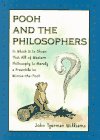 Book Reviews by Sondra Eklund
Book Reviews by Sondra Eklund

|

|
|
Nonfiction
Humorous Previous Book Next Book Fiction Young Adult Fiction Children's Nonfiction Children's Fiction Picture Books 2004 Stand-outs Previous Book Next Book 2003 Stand-outs 2002 Stand-outs 2001 Stand-outs Five-Star Books Four-Star Books PreviousBook Next Book Old Favorites Back Issues List of Reviews by Title List of Reviews by Author Why Read? Children and Books Links For Book Lovers About Me Contact Me Subscribe Post on Bulletin Board View Bulletin Board I don't review books I don't like!
*****= An all-time favorite |

****Pooh and the PhilosophersIn Which It Is Shown That All of Western PhilosophyIs Merely a Preamble to Winnie-the-Poohby John Tyerman Williams
Reviewed April 20, 2004.
Dutton Books, New York, 1995. 212 pages. Sonderbooks Stand-out 2004, #4, Humorous Nonfiction This is a hilarious book for readers of sophisticated taste, the sort of book that gets me laughing out loud and reading bits to innocent bystanders. John Tyerman Williams writes the book with a completely straight-faced tone. Mr. Williams explains the book well in the first paragraph: “A. N. Whitehead told us that the European philosophical tradition ‘consists in a series of footnotes to Plato.’ And he was partly right. All we need to do is to delete ‘Plato,’ insert ‘Winnie-the-Pooh,’ and change ‘a series of footnotes’ to ‘a series of introductions.’ This work will demonstrate beyond all reasonable doubt that the whole of Western philosophy—including, of course, Plato himself—is best considered as a long preparation for Winnie-the-Pooh. Philosophy since Winnie-the-Pooh does naturally consist of footnotes to ‘that sort of Bear.’” The amazing thing is that, although he may be keeping his tongue in cheek, Mr. Williams does show us the principles of the philosophers clearly (well, sometimes slightly hidden) presented in the stories of Winnie-the-Pooh. He takes us through the ancient Greek philosophers, the Seventeenth Century rationalists, the British empiricist tradition, the German philosophers, and the existentialists. Besides entertainment, this book is also a great introduction to philosophy. Do you want to know the basic ideas of the philosophers throughout history? This book tells you those ideas and show you how Winnie-the-Pooh expounds on them. My sixteen-year-old son said that reading this book was a great help in keeping straight different philosophers who turned up in Brain Bowl questions. It’s hard to pick out any one example without giving you the whole chapter and the train of thought that so delightfully make the author’s case. Here, for example, is a passage showing how Pooh demonstrates the teachings of Kant: “‘You never can tell with bees,’ said Winnie-the-Pooh.’ We have previously looked at this dictum from a Cartesian point of view. But it is also a clear reference to Kant’s basic teaching that things in themselves (noumena) are unknowable.” In another passage: “However anxious we may be to avoid the charge of ethnocentrism, we can hardly deny that Winnie-the-Pooh is a very English bear. It is therefore natural to find him, in every sense, a stout supporter of the British Empiricist tradition, which maintains that all statements must be testable by experience. Here we have an excellent example of the empirical approach in this investigation and final confirmation of the hypothesis that the honey jar did in fact contain honey and nothing else.” Those who, like me, have long loved and treasured the books about Winnie-the-Pooh will be astonished by how blinded their eyes have been. After reading this book, I can’t help but wonder how I could have possibly, all this time, actually believed that Pooh was a Bear of Very Little Brain, when all along Pooh was “merely continuing the tradition of Socrates, who constantly professed to be an ignorant enquirer.” Still, John Tyerman Williams gives me consolation on his last page: “As we should expect, Winnie-the-Pooh himself puts it in perspective. He clearly foresaw the gradual emergence of his intellectual reputation when he invented the game of Poohsticks. Rabbit saw the point when he said, ‘They [previous Ursinian scholars] always take longer than you think.’” There are many of you out there who Need to buy this book. You know who you are. Reviews of Related Books: Winnie-the-Pooh Winnie-the-Pooh audiobook The Natural World of Winnie-the-Pooh Copyright © 2005 Sondra Eklund. All
rights reserved. |